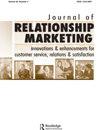Social Media Communication and Consumers Decisions: Analysis of the Antecedents for Intended Apps Purchase
Q2 Business, Management and Accounting
引用次数: 8
Abstract
Abstract The purpose of this study is to investigate how consumer’s socialization could shed light on social commerce apps behavioral intention (SCABI). Social commerce communication, virtual community trust, post-usage usefulness, perceived enjoyment, subjective norm, attitude toward the apps, and behavioral control are proposed as the several antecedents of behavioral intention of social commerce purchase decisions. Drawn from the Theory of Planned Behavior and social exchange paradigm, a theoretical model was developed and a list of (17) hypotheses was tested empirically. The sample included 230 respondents; structured equation modeling (SEM) was employed for measurement and structural evaluation. Prior to the evaluation of the measurement model and structural relationships, the indices for evaluation of goodness of model fit were obtained and the results show satisfactory values. The statistical results imply a reliable and valid measurement scale and the direct relationships were mostly supported. However, the virtual community trust → post usage usefulness, perceived enjoyment → SCABI, social commerce communication → attitude, attitude → SCABI, and subjective norm → attitude relationships were not supported. Therefore, social media, which is a highly social-related communication platform, plays a pivotal role in consumer decision making for online product purchases. Practical and theoretical implications are discussed.社交媒体传播与消费者决策:预期应用购买前因分析
摘要本研究旨在探讨消费者的社会化行为如何影响社交商务应用程序的行为意向(SCABI)。社交商务沟通、虚拟社区信任、使用后有用性、感知享受、主观规范、对应用的态度和行为控制是社交商务购买决策行为意向的几个前因。从计划行为理论和社会交换范式出发,建立了一个理论模型,并对17个假设进行了实证检验。样本包括230名受访者;采用结构方程模型(SEM)进行测量和结构评价。在对测量模型和结构关系进行评价之前,获得了模型拟合优度评价指标,结果令人满意。统计结果表明,测量量表可靠有效,且大部分支持直接关系。虚拟社区信任→帖子使用有用性、感知享受→SCABI、社交商务传播→态度、态度→SCABI、主观规范→态度关系不被支持。因此,社交媒体作为一个高度社交化的传播平台,在消费者网购决策中起着举足轻重的作用。讨论了实际意义和理论意义。
本文章由计算机程序翻译,如有差异,请以英文原文为准。
求助全文
约1分钟内获得全文
求助全文
来源期刊

Journal of Relationship Marketing
Business, Management and Accounting-Marketing
CiteScore
10.20
自引率
0.00%
发文量
7
期刊介绍:
The Journal of Relationship Marketing is a quarterly journal that publishes peer-reviewed (double-blind) conceptual and empirical papers of original works that make serious contributions to the understanding and advancement of relationship and marketing theory, research, and practice. This academic journal is interdisciplinary and international in nature. Topics of interest (not limited to): Evolution and life cycle of RM; theoretical and methodological issues in RM; types of RM, networks and strategic alliances; internal communication, quality, trust, commitment, satisfaction, loyalty, and dissolution in RM; applications of RM in different disciplines and industries; international perspectives in RM; RM strategies in services economy, higher education, and e-commerce; RM, technology, and the Web; profitability and RM; case studies and best practices in RM. If you are interested in becoming an ad-hoc reviewer, please e-mail a brief statement indicating your area of expertise and interest along with a copy of your CV.
 求助内容:
求助内容: 应助结果提醒方式:
应助结果提醒方式:


